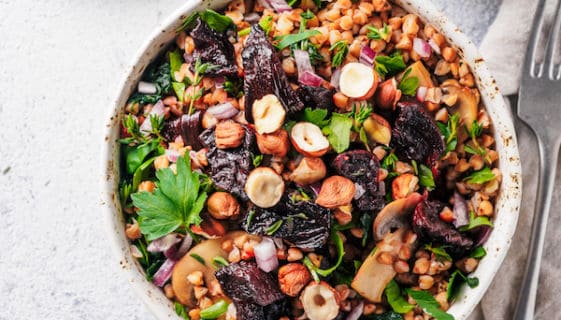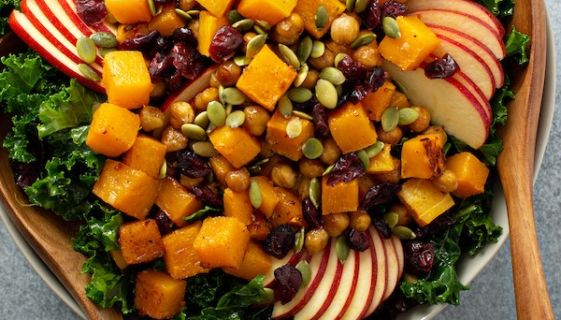Our simple, light, bright, and delicious roasted spring carrot and asparagus salad is a tasty way to showcase some of the season’s best produce. This salad is packed with vibrant spring veggies: peppery arugula, crisp radishes, sweet carrots, and earthy asparagus. We then toss them with a zesty fig vinaigrette, sprinkle on some goat cheese for a creamy tang, and add some nuts for a lovely crunch. In addition to its delicious taste and textures, the ingredients of this salad provide an abundance of health-supporting properties. Roasting carrots and asparagus with a little oil will increase their antioxidant level and allow our bodies to absorb more available nutrients.
It’s fun to experiment with other seasonal vegetables and toppings. The dressing tastes good on everything. One of my favorite ways to use the leftover fig vinaigrette is to drizzle it on ricotta toast. Or try it as a marinade for fish, veggies, tofu or chicken.
Roasted Spring Carrot and Asparagus Salad with a Fig Vinaigrette
Serves: 4
Ingredients
Roasted Veggies
- 3 tbsp high heat oil (avocado, sunflower, coconut)
- 1 ½ tsp dried or fresh thyme leaves
- ½ tsp salt
- ½ tsp black pepper
- 2 tsp balsamic vinegar
- 1 bunch asparagus, tough ends trimmed then cut in half
- 1 bunch spring carrots (smallish, more tender), cut in half long ways then into 2 inch pieces
- 1 lemon, zest for vegetables and reserve juice for dressing
Salad
- 4 handfuls of arugula
- 1 bunch of radishes, sliced
- ½ cup walnuts, chopped (you can use any nut or seed)
- ½ cup goat cheese
Dressing
- 1 small shallot
- 4 large fresh figs, 8 dried figs, or 2 tbsp fig preserves (If using dried figs, soak for 15 minutes in hot or boiling water. Save water to use in the dressing.)
- 1 tbsp lemon juice
- 1 tbsp balsamic vinegar
- 1 tsp Dijon
- 3 tbsp olive oil or walnut oil
- ¼ cup water
- Sprinkle of salt and pepper
Directions
- Preheat the oven to 425°F.
- Add the oil, thyme, salt, pepper, and balsamic to a medium to large bowl and whisk together.
- Add the asparagus and carrots to the bowl and toss to coat with oil mixture evenly.
- Transfer vegetables to a large baking sheet and spread them out into one even layer. Scrape out any remaining oil mixture onto the vegetables.
- Roast in the oven for 20 minutes; toss after 10 minutes for even browning.
- Once crisp on the outside and tender on the inside, remove from the oven and sprinkle with lemon zest. Allow veggies to cool for 10 minutes.
- While the veggies are cooling, add all of the dressing ingredients except the oil to a blender and blend well. Add the oil and blend to incorporate. If the dressing is too thick, you can add a little more water, starting with a tablespoon at a time. Add salt and pepper to taste.
- You can make individual salad plates, or make one large flat-ish bowl. If you plate the salad: Add one handful of arugula to four bowls, then divide radishes, walnuts, goat cheese, and roasted vegetables equally for each bowl. I like to put the veggies right in the center of the arugula and surround them with the other ingredients. Drizzle with dressing or serve on the side.
This salad also tastes great, topped with fish, chicken, shrimp, falafels, or crispy chickpeas.
Nutrient Highlights
Carrots: Packed full of Beta-carotene (precursor to vitamin A). Vitamin A is integral for vision and immune function, as well as skin and bone health. Beta-carotene is a powerful antioxidant that can reduce inflammation and boost immune function by increasing disease-fighting cells and assisting cells in protection against viruses. Carotenoid-rich foods (orange foods) can help reduce the risk of heart disease and cancer (especially in the lungs, esophagus, and stomach), and can improve immune system function. Carrots are also an excellent source of vitamin C, an antioxidant that helps destroy free radicals and support the body’s natural immune response by reducing oxidative stress.
Asparagus: Contains a blend of nutrients to help boost energy, cleanse the urinary tract and neutralize excess ammonia in the body. It is high in anti-inflammatory properties from its high amount of antioxidants, including vitamin C, beta-carotene, vitamin E as well as glutathione, which has been shown to slow the aging process and protect our skin from sun damage and pollution.
Arugula: Greens such as kale, spinach, collards, mustard greens, arugula, and chard have been shown to protect bones from osteoporosis, reduce inflammation, support a healthy gut, strengthen the immune system, protect cognition and supply a high number of antioxidants. They are among some of the best cancer-preventing foods.
Radish: Cruciferous vegetable that has anticancer properties. Radishes are also great sources of fiber to help with balancing blood sugar and supporting gut health. Contains properties that help maintain the elasticity of our skin and boost our immune system.
Figs: Very high in potassium to help maintain balanced blood pressure. Also high amounts of antioxidants to neutralize harmful free radicals leading to anticancer effects. Will promote skin and bone health due to high amounts of calcium and magnesium. Also high amounts of fiber for a healthy digestion.
Mustard: Make sure to read the ingredient list when buying mustard to ensure that it does not have added sugar or food coloring. All cruciferous vegetables are part of the mustard family. Mustard seeds are rich in glucosinolates, a compound that stimulates the body’s antioxidant defenses. This condiment not only adds flavor but can increase the anti-inflammatory, antibacterial, and anticancer effects of other ingredients.



 Ananda Kaplan
Ananda Kaplan 

